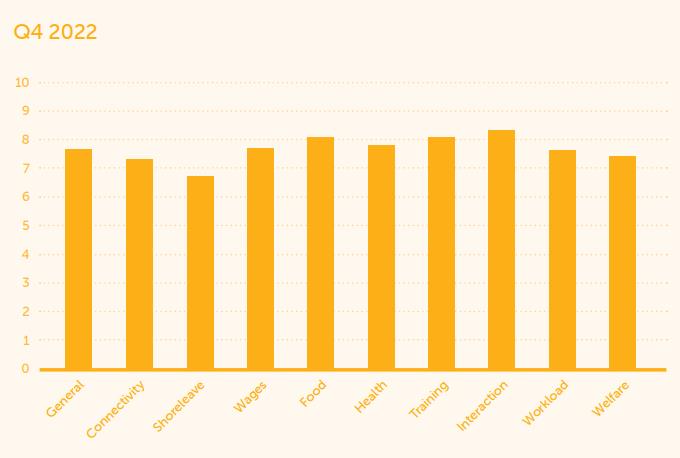Latest Seafarers Happiness Index (SHI) from the Mission to Seafarers reached 7.69/10, reflecting positive progress. Even the historically most problematic areas, such as shore leave and access to welfare ashore, have recovered and this has helped drive the average upwards. However, respondents made it clear further improvements are needed with respect to workload, training and social cohesion.
According to the data, most aspects of sea life are trending upwards than they have in the past year. However, it was noticeable that a significant number of seafarers appeared to have recently switched employer or trading patterns.
From the responses we received there seems to have been a surge in seafarers switching jobs. As such there was more talk involving short sea or even inland waterways, reflecting the new trades that some have switched to.
According to feedback, seafarers decided to move jobs to either sail closer to home in the event of additional travel restrictions, or to better ensure trip rosters and schedules could be maintained.
The Mission to Seafarers also heard from a number of seafarers new to the industry – both as trainees or crew. These seem to be from nations which were traditionally not major maritime labour markets, with the likes of Pakistan, Bangladesh and Sri Lanka coming to the fore. As in previous reports, crew members continued to express their relief at the return of freedom of movement, as well as their increased sense of certainty and stability.
Despite the positive data, there are still issues that need to be fixed, and although seafarers appear to be more optimistic than we have previously seen, there remain persistent issues, such as workload, mental health impacts, and the stresses of a difficult job to contend with.
… the report highlights

Connectivity onboard
Connectivity was the only area in which there was a decline this time around. Quality and cost are still a concern, and there is a growing demand for free or inexpensive access. The demand for faster and better quality access also reflects this.
The message remained the same in so many responses: “we want free access to the internet”. Additionally, seafarers have a strong desire for better access to high quality entertainment and content. In keeping with the trend ashore to stream content there is a growing demand for the same access at sea. Indeed, the days of straining shelves full of counterfeit DVDs appearing to be over, and seafarers want a more modern approach to onboard entertainment.
Access to shore leave
Shore leave is more than just a problem about getting off the ship; it has developed into a sense of conflict and something of a power struggle. We are seeing that seafarers do not necessarily always want to go ashore, indeed they frequently don’t – not least because of cost and work load. They do, however, want to feel that they can make their own decisions, and so want to feel more certain of their options, and have a sense of choice.
So seafarers feel deprived of the opportunities for recreation and relaxation they ought to have, and there is frustration about having to pay over the odds to get ashore, or to even have to “beg” officials, superiors or employers for shore leave. There is a feeling that access to shore leave should be a right and a choice, not seen as some kind of benefit.
Wages/ Salaries
The issue of wages/salaries has risen ever so slightly across the year, though seems based more on the sense of relief of getting paid at all in such turbulent times, rather than the rates of pay. As stated by one seafarer:
“The money I earn has become even more important as many jobs have been lost in my home country”. This sentiment perhaps captures the overlooked reality for many seafarers, that they bear the weight of so much for their families and communities. During the past couple of years, as many seafarers’ family members have had to adapt to a pandemic and search out new opportunities, it has been the seafarers who have often continued to be providers. This is a burden proudly borne by many, and seafarers often tell us of the pride they have in providing.
Food onboard
It was seen over these most trying times, that food and the routine of meals on board took on even greater importance and significance. The dining experience, the social elements, as well as nutrition, have all come to the fore. Fortunately, it appears that happiness levels have been rising, and the food has continued to be well received by many respondent.
However, there were also critics, one of whom stated: “The food quality on board is getting worse and worse.” As global inflation increases, budgets are constrained, and suppliers select low-quality food for vessels in order to maximise profits, meaning that seafarers consume a lot of junk food.






























































